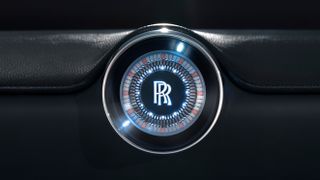Rolls-Royce teases 'historic announcement' for its electric car plans
Says it'll reveal "the next chapter in this extraordinary story"

Rolls-Royce is a historic automaker whose vehicles defy reason, financial savvy, and conventional design. With a few cars and an SUV in its catalog, all of which costing well north of $100,000, Rolls hasn't been one to dabble in changing its decades-long run of serious, petrol-powered luxury vehicles.
That's about to change, however. CEO Torsten Müller-Ötvös previously announced that Rolls-Royce would move directly from internal combustion engines to electric powertrains, skipping PHEV (plug-in hybrid electric vehicle) and HEV (hybrid electric vehicle) designs.
According to the latest Rolls-Royce press release, we'll find out how significant the company's first steps will be on September 29 with a "historic announcement."
- Mercedes EQS: what you need to know about the super-premium EV
- EV charging connector types: what they are and how they compare
- The fastest accelerating electric cars in the world
The firm has dabbled in electrification in the past, although only in concept form. The first Rolls-Royce EV was a one-off Phantom concept that appeared in 2011, powered by two rear axle-mounted electric motors with total output was 389 horsepower and 590 pound-feet of torque, while a 71kWh battery offered 120 miles of range.
That vehicle was followed by the 103EX concept in 2016, but the automaker has otherwise relied on internal combustion for propulsion.
Neither of these concept cars managed to spur a production-ready electric vehicle from the firm.
It's unlikely we'll see a production-ready electric car this week however, as Rolls-Royce followed up details of its previous two concept EVs tipping the announcement as "the next chapter in this extraordinary story" - suggesting we may see another concept.
Get daily insight, inspiration and deals in your inbox
Get the hottest deals available in your inbox plus news, reviews, opinion, analysis and more from the TechRadar team.
However, as the firm has committed to building a production EV by 2030 - but "only when the time is right, and every element meets Rolls-Royce's technical, aesthetic and performance standards" - any new concept could give us a strong bearing on what to expect by the end of the decade.
Analysis: a helping hand from BMW?
Rolls-Royce enjoys life as part of the BMW empire, so there could be some parts and technology sharing between the two.
There have been no indications that Rolls would use BMW tech, however, so the level to which one supports the other in their electric car endeavors is yet to be seen.
The move to electrification makes perfect sense for Rolls-Royce. Silent propulsion from a seemingly magically powerful engine is right in the automaker's wheelhouse, and the fact that its vehicles are already large, heavy cruisers means that batteries and other electric vehicle powertrain components won't make a giant difference in handling and performance.
We'll have to wait for 1.00pm BST (8am ET / 5am PT) on Wednesday, September 30, to see what, exactly, Rolls has up its sleeve.

After working in the technology and software industry for several years, Chris began writing as a way to help people outside of that world understand the sometimes very technical work that goes on behind the scenes. With a lifelong love of all things automotive, Chris turned his attention to writing new vehicle reviews, detailing industry trends, and breaking news. Along the way, he earned an MBA with a focus on data analysis that has helped him gain a strong understanding of why the auto industry’s biggest companies make the decisions they do.
